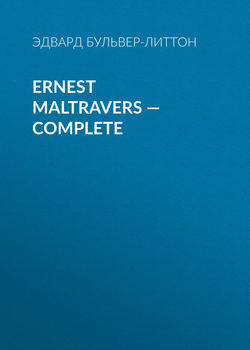Читать книгу Ernest Maltravers — Complete - Эдвард Джордж Бульвер-Литтон, Эдвард Бульвер-Литтон - Страница 10
ERNEST MALTRAVERS BOOK I CHAPTER VII
Оглавление“How like a younker or a prodigal,
The scarfed bark puts from her native bay!”
Merchant of Venice.
WE are apt to connect the voice of Conscience with the stillness of midnight. But I think we wrong that innocent hour. It is that terrible “NEXT MORNING,” when reason is wide awake, upon which remorse fastens its fangs. Has a man gambled away his all, or shot his friend in a duel—has he committed a crime or incurred a laugh—it is the next morning, when the irretrievable Past rises before him like a spectre; then doth the churchyard of memory yield up its grisly dead—then is the witching hour when the foul fiend within us can least tempt perhaps, but most torment. At night we have one thing to hope for, one refuge to fly to—oblivion and sleep! But at morning, sleep is over, and we are called upon coldly to review, and re-act, and live again the waking bitterness of self-reproach. Maltravers rose a penitent and unhappy man—remorse was new to him, and he felt as if he had committed a treacherous and fraudulent as well as guilty deed. This poor girl, she was so innocent, so confiding, so unprotected, even by her own sense of right. He went down-stairs listless and dispirited. He longed yet dreaded to encounter Alice. He heard her step in the conservatory—paused, irresolute, and at length joined her. For the first time she blushed and trembled, and her eyes shunned his. But when he kissed her hand in silence, she whispered, “And am I now to leave you?” And Maltravers answered fervently, “Never!” and then her face grew so radiant with joy that Maltravers was comforted despite himself. Alice knew no remorse, though she felt agitated and ashamed; as she had not comprehended the danger, neither was she aware of the fall. In fact, she never thought of herself. Her whole soul was with him; she gave him back in love the spirit she had caught from him in knowledge.
And they strolled together through the garden all that day, and Maltravers grew reconciled to himself. He had done wrong, it is true; but then perhaps Alice had already suffered as much as she could in the world’s opinion, by living with him alone, though innocent, so long. And now she had an everlasting claim to his protection—she should never know shame or want. And the love that had led to the wrong should, by fidelity and devotion, take from it the character of sin.
Natural and commonplace sophistries! L’homme se pique! as old Montaigne said; Man is his own sharper! The conscience is the most elastic material in the world. To-day you cannot stretch it over a mole-hill, to-morrow it hides a mountain.
O how happy they were now—that young pair! How the days flew like dreams! Time went on, winter passed away, and the early spring, with its flowers and sunshine, was like a mirror to their own youth. Alice never accompanied Maltravers in his walks abroad, partly because she feared to meet her father, and partly because Maltravers himself was fastidiously averse to all publicity. But then they had all that little world of three acres—lawn and fountain, shrubbery and terrace, to themselves, and Alice never asked if there was any other world without. She was now quite a scholar, as Mr. Simcox himself averred. She could read aloud and fluently to Maltravers, and copied out his poetry in a small, fluctuating hand, and he had no longer to chase throughout his vocabulary for short Saxon monosyllables to make the bridge of intercourse between their ideas. Eros and Psyche are ever united, and Love opens all the petals of the soul. On one subject alone, Maltravers was less eloquent than of yore. He had not succeeded as a moralist, and he thought it hypocritical to preach what he did not practise. But Alice was gentler and purer, and as far as she knew, sweet fool! better than ever—she had invented a new prayer for herself; and she prayed as regularly and as fervently as if she were doing nothing amiss. But the code of Heaven is gentler than that of earth, and does not declare that ignorance excuseth not the crime.
